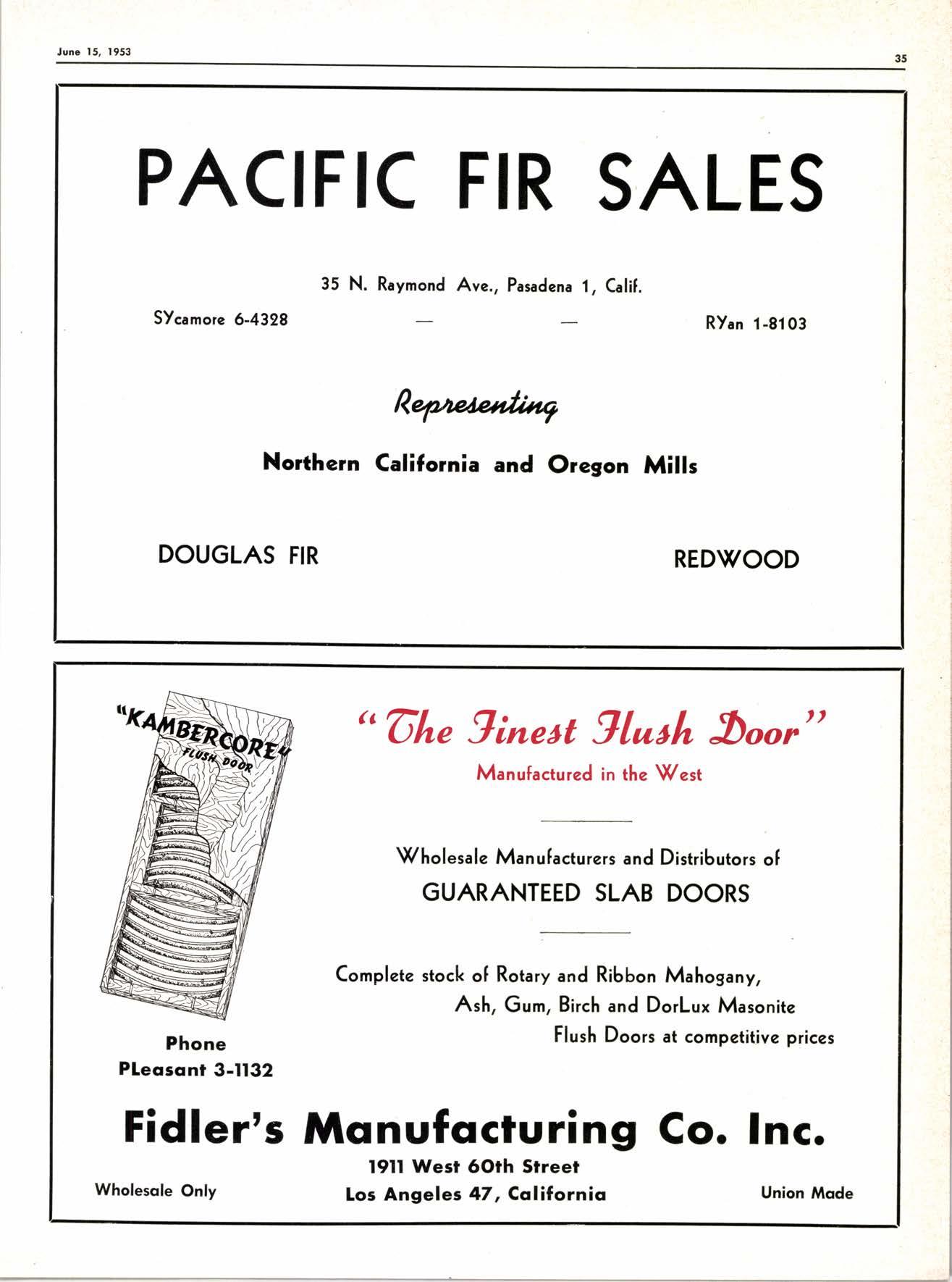
3 minute read
PACIFIC FIR SALES
SYcamorc 6-4328
Northern California and Oregon Mills
Ryan 1-g103
DOUGLAS FIR RED\TOOD " 6lte
Manufactured in the West
\(/holesale Manufacturers and Distributors o[
GUARANTEED SLAB DOORS
Complete stock of Rotary and Ribbon Mahoganyr
Ash, Gum, Birch and DorLux Masonite
Flush Doors at competitive prices
Pleqsqnr 3-t132
Encherishin
The lady had been waiting anxiously for news of a close relative whose life was in danger, and her old colored cook was all sympathy. Finally the telegram came and the cook brought it in. "Heah it is, Missy," she said, "hea's de wiah you bin lookin' fo'; an' I suttinly hopes it brings you encherishin' news."
Three Grecrt Events in Americqn History
A trioof succeeding and interlocking events which, combined, have had as great an effect on our modern civilization as the telegraph, the telephone, and the steam engine, were: The creation of the internal-combustion engine; the discovery of petroleum in great quantities; and the discovery of the gasoline tax. \11/e had had oil production in small o-uantities since the middle of the last century. When the internal-combustion engine came along we couldn't use a great many of them for want of motor fuel. Then, in 1901, the Spindletop oil field came in at Beaumont, Texas, and since that time we have had gasoline to burn. (That's a joke, son.) Naturally the motor car industry sprang into tremendous life. But soon it had to slow down. We had plenty of motors to burn gasoline, and plenty of gasoline to drive the motors, but we had neither roads nor bridges nor the countless wealth required to build them. Then, in 1919, the State of Oregon discovered the gasoline tax, which in thirty odd years has crisscrossed the continent-and other continents-with highways, and built the millions of bridges and crossings, making possible the mighty motor car and oil industries of today. And every year these industries are improved and developed by new research and new brains and efforts. Truly, the world do move; but it never started really moving FAST until the three discoveries here discussed, came along.
Certcrinly Looks Like It
Charlie McCarthy had a famous lady columnist on his radio one day; and he asked her what sort of a girl she thought he ought to marry. She said: "Well, Charlie, I think you should marry a good cook and a lovely and intelligent girl." "But, lady," said Charlie, "Ain't that bigamy?"
Mcrke Me Worthy
It is a joy in life to find, At every turning of the road, The strong arm of a comrade kind, To help me onward with my load. And since I have no gold to give, And love alone must make amends, My only prayer is, while I live God make
Cowpuncher's Prcryer
"Let me be easy on the man that's down, And make me square and generous with dl; I'm careless, Lord, sometimes when I'm in town, But never let them say I'm mcan or small."
Oscar Rush
Scrid the Pessimist
"Disaster must have befallen threc customers of minc. One of them said to me: 'I'll pay you Saturdan if I live.' F{e must be dead. Another said: 'I'll see you tomorrow about that money I owe you.' He must be blind A third said: 'If I don't pay you this week I hopc I go to HelL' Wonder how the climate is where he is?"
The late u. s.
s."Ti'T##g
carolina, Josiah w. Bailey, once wrote a letter to a friend that belongs, in part at least, in dl literary scrapbooks. He was explaining to this friend why he chose the hard way in potitics, whcn hc could easily have gone along with the New Dcd tidc that was then running strongly in Washington. FIe said in thc beginning of his letter that no man lovcd popular acclaim better than he did, or hated worse to go against thc popular tide, but that there were other considerations of great importance, and other examples ttat causcd him to rejcct the easy way, and he added:

"I remember one Pontius Pilate. He pleascd the crowd, and let them slay their best friend. I{c went ttre casy way. So he held the governorship. I do not admire him, but he was a smart politician ! I remember onc Peter, a 6sherman, who dechared to the people demanding that thcy agree -'\l/g ought to please God ratAer than man !' He went the hard way. They tell me he lost his lifc on the cross ! But I admire him.I remember Christopher Columbus, thc majority of whose sailors demandcd that he turn back, but who nevertheless pressed on. He waE rnoat unpopular with his crew. But he discovered America! I remembcr Robcrt E. Lee, who refused the command of the Union army and all the rewards of national gratitude, to do his duty to his state ! He went the hard way. There are somc who cdl him traitor ! But there are more to whom he is an inspiration.
"I remember Moses, who chose to dwell in the tents of the wandering tribes of Israel, rather than the palaces of the Pharaohs. He went the hard way. But God gave him a mountain-top to die on! And HE IS ON THAT MOUNTAIN STILL! I remember Him who said to the Pharisees-'Your fathers stoned the prophets and you build monuments to them !' He died upon the instrument of the slaves torture, but all men look up to Him on that cross ! None of these were popular men ! They, unlike Pilate, went against the tide of public opinion ! None of them was ever Governor !"











